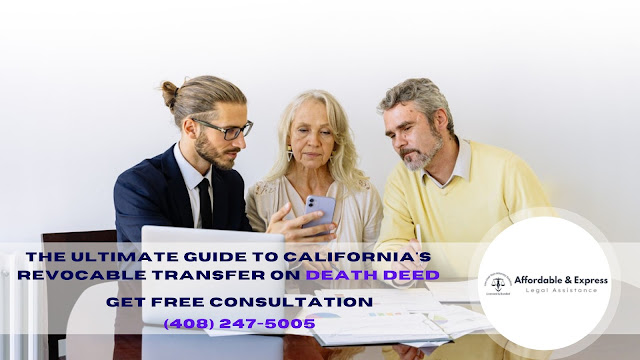The Ultimate Guide to California's Revocable Transfer on Death Deed
Are you looking for a way to simplify the transfer of your real property in California to your beneficiaries after your death? If so, the revocable transfer on death (TOD) deed may be just what you need. In this ultimate guide, we'll cover everything you need to know about this legal tool, including what it is, how it works, and why it may be a good fit for your estate planning needs. 1. Introduction Estate planning can be a daunting task for many people, but it doesn't have to be. A revocable transfer on death (TOD) deed is a legal tool that can help you avoid the probate process and simplify the transfer of your real property to your beneficiaries after your death. This guide will provide an in-depth look at the revocable transfer on death deed, including its benefits and limitations, who can use it, how to create it, and more. 2. What is a Revocable Transfer on Death Deed? A revocable transfer on death (TOD) deed is a legal document that allows you to transfer your real property to one or more beneficiaries upon your death. Unlike a traditional will or trust, a TOD deed transfers ownership of the property outside of the probate process, which can save time and money for your beneficiaries. The revocable nature of the deed means that you can change your mind and revoke it at any time. 3. Advantages of a Revocable Transfer on Death Deed One of the main advantages of a revocable transfer on death deed is that it allows you to avoid the probate process. This can save your beneficiaries time and money, as probate can be a lengthy and expensive process. Additionally, because the transfer occurs outside of probate, it can be completed much more quickly. Another advantage of a TOD deed is that it allows you to retain ownership and control of the property during your lifetime, which means you can continue to use and enjoy the property as you wish. 4. Limitations of a Revocable Transfer on Death Deed While a revocable transfer on death deed can be a useful estate planning tool, it does have some limitations. For example, TOD deeds are only effective for real property in California. Additionally, if you have outstanding debts or liens on the property, those debts and liens will not be discharged or released upon your death, and your beneficiaries will be responsible for paying them. 5. Who Can Use a Revocable Transfer on Death Deed? In California, anyone who is of legal age and owns real property can use a revocable transfer on death deed. However, if you are married and own the property with your spouse as community property, both spouses must sign the deed. 6. How to Create a Revocable Transfer on Death Deed in California To create a TOD deed, you must complete and sign a specific form that complies with California law. You can find this form on the California Legislative Information website or at your local county recorder's office. It's important to note that the form must be notarized in order to be valid. 7. Filling out a Revocable Transfer on Death Deed Form When filling out the TOD deed form, you will need to provide specific information about the property, including its legal description and address. You will also need to name one or more beneficiaries who will receive the property upon your death. It's important to note that the beneficiary or beneficiaries named on the TOD deed will receive the property automatically upon your death, regardless of what your will or trust may say. 8. Recording and Revoking a Revocable Transfer on Death Deed After you have completed the TOD deed form and had it notarized, you will need to record it with the county recorder's office in the county where the property is located. Once recorded, the TOD deed becomes effective immediately, but you can still revoke it at any time by completing and recording a new TOD deed, executing a revocation document, or transferring the property to someone else. 9. Alternatives to a Revocable Transfer on Death Deed While a revocable transfer on death deed can be a useful estate planning tool, it may not be the best option for everyone. Depending on your individual circumstances, a will or trust may be a better fit. Additionally, if you have multiple properties or complex assets, a comprehensive estate plan that includes a will, trust, and other documents may be necessary to ensure that your wishes are carried out. 10. Frequently Asked Questions Q : Can I use a TOD deed for personal property? A : No, TOD deeds can only be used for real property in California. Q : Can I name multiple beneficiaries on a TOD deed? A : Yes, you can name as many beneficiaries as you wish on a TOD deed. Q : Can I change my mind after recording a TOD deed? A : Yes, you can revoke or change a TOD deed at any time. Q : Do I need an attorney to create a TOD deed? A : No, you do not need an attorney to create a TOD deed, but it's always a good idea to consult with one to ensure that your estate plan meets your individual needs. Q : Can a TOD deed be used to transfer property outside of California? A : No, TOD deeds are only valid for real property located in California. 11. Conclusion A revocable transfer on death deed can be an effective tool to ensure a smoother transfer of your real property to your beneficiaries after your death. However, it's important to weigh its limitations and suitability for your individual circumstances carefully. Seeking advice from an attorney who specializes in estate planning can help you make an informed decision. If you're looking for reliable and affordable legal services in Santa Clara county, look no further than Affordable and Express Legal. Our team of experienced probate Attorneys Santa Clara county can help you with your estate planning needs and ensure that your wishes are carried out effectively. Contact us today to learn more about our services and how we can assist you. Don't wait until it's too late to plan for the future of your loved ones.


Comments
Post a Comment